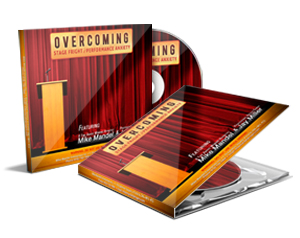Accepting Failure
It’s Essential for Success
As a speech coach and presentation trainer, I have a front row seat, watching people deal with failure. While I’m the last person to claim mastery over this challenge, my work gives me an ongoing and close-up perspective on the typical reaction to failure and how it affects learning, growth and change.
If you’re like most people, you try hard to avoid failure. It’s frustrating and discouraging. Frustrating because it represents a delay or setback in reaching your goal. Discouraging because it seems like a bad sign and a poor reflection on your self-image. You’d rather not experience failure, thanks anyway. But failure is part of your existence—life and death, light and dark, success and failure—you can’t have one without the other. Avoiding failure actually diminishes your chances of experiencing success.
Resisting failure creates paralysis. In the larger sense, when you’re worried about failing, you avoid risk and don’t take action, so nothing is achieved. Everybody knows that. But it’s also true at a physical and mental level. When you’re afraid you might fail, you literally get tense and don’t perform as well as you could. So it becomes a self-fulfilling prophecy.
The fear of failure causes distraction. Rock climber, Matthew Childs said, “Fear really sucks because it means you’re not focusing on what you’re doing; you’re focusing on the consequences of failing what you’re doing.” When you’re determined to avoid the wrong result you become less focused on your technique. And when your technique suffers, your performance suffers. So you run smack into the thing you were trying to avoid.
Trying to avoid failure promotes stagnation. Growth happens at your threshold, where things become difficult. If you insist on staying in your comfort zone where things are easy and you get it right every time, nothing will change. Woody Allen said, “If you’re not failing every now and again it’s a sign you’re not doing anything very innovative.” If you want to fly, you have to get used to being at the edge of the cliff.
Finally, avoiding failure generates anxiety and robs you of joy. Activities that could be fascinating learning experiences become intimidating and weighed down with expectations. Your motivation suffers and there’s little incentive to practice. What could have been rewarding and engaging becomes just another source of stress. Give yourself permission to play. “It is not failure if you enjoyed the process.” (Oprah Winfrey)
How can you embrace failure in a way that keeps you open to success? It helps to change the meaning of failure. Remember, failure is not you. Failure is just part of what you’re doing, part of your process. “Failure is an event, not a person.” (Zig Ziglar) Next, failure is just information. Tony Robbins said, “There is no such thing as failure. There are only results.” The results show you what’s working and what needs more attention. Finally, failure is an opportunity. It’s a chance to begin again, with more awareness and information than you had before. That’s an advantage.
“If you see a failure as an opportunity to learn and get better, it will be. If you perceive it as a mortal blow, it will be. In that way, the power of the story is more important than the experience itself. (Dr. Jim Loehr)
 The Sound of Success
The Sound of SuccessEnroll in this FREE video mini course and discover a powerfully attractive voice.
 Your Confident Voice
Your Confident VoiceThis 145-minute mp3 download is a complete speaking voice course. The simple but amazingly effective program is on sale this month!
 Overcoming Stage Fright
and
Overcoming Stage Fright
andPerformance Anxiety
On this mp3 download, Jay Miller teams up with six-time award-winning hypnotist Dr. Mike Mandel to deliver the most comprehensive program available for reducing or eliminating stage fright.